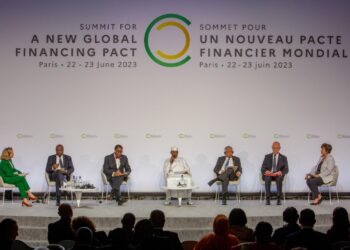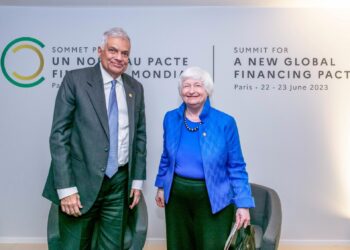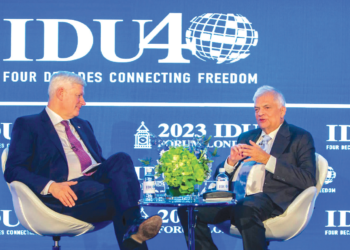The Manchester City Football Club made history by entering the Treble Hall of Fame. A 68th-minute strike catapulted it to victory, nailing its first-ever European Cup victory this season – the Champions League Trophy at the Ataturk Olympic Stadium in Istanbul, Turkey, on June 10, 2023 preceded by their success at the Premier League and the FA Cup, a feat by an English football club after nearly a quarter century.
By Jennifer Paldano Goonewardane.
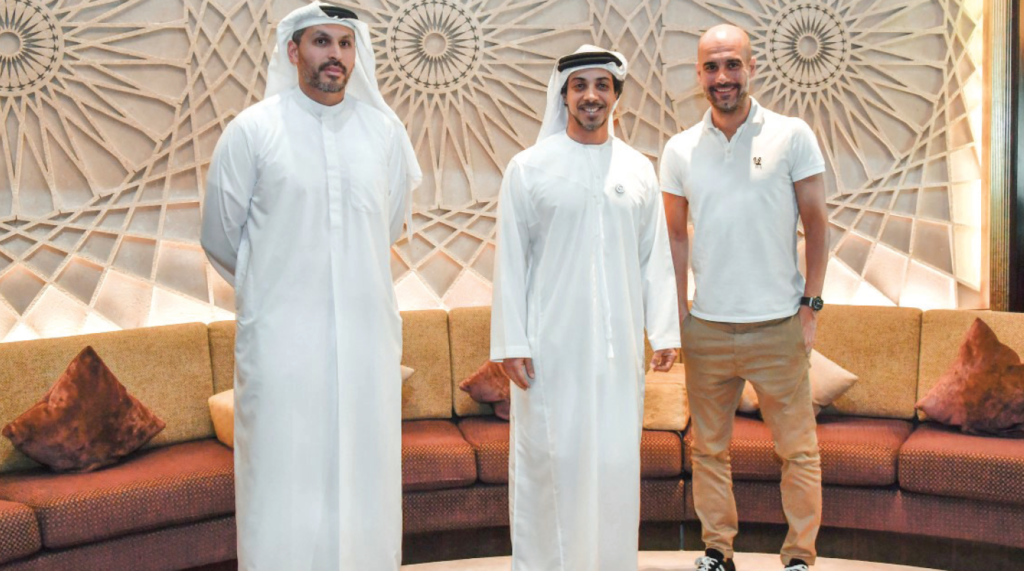
Khaldoon Khalifa Al Mubarak, Chairman of the Executive Affairs Authority, UAE, and Chairman of both Manchester City FC and City Football Group; H.H. Sheikh Mansour bin Zayed Al Nahyan, Deputy Prime Minister, UAE Vice President and Minister of Presidential Affairs, owner of Manchester City Football Club with Pep Guardiola, Manchester City FC Manager.
Manchester City Football Club has sealed its name in English football as one of the greatest football clubs following its three victories, the European title being the most coveted. Before them, the only other English Club to hold the enviable treble champions title was Manchester United, which they did under the leadership of Sir Alex Ferguson in the 1998-99 season. Such a rare feat is often down to many reasons. Football clubs attract some of the most lucrative sponsorships. They contract some of the world’s most sought-after players, a fierce competition that sees intense bidding to clinch the best players with the winning spark. Manchester City, for instance, contracted Norwegian striker Erling Haaland for a deal worth £51 million.
Behind the hype and the hoopla of the treble title by Manchester City stands a formidable figure, the strategist doing the queen’s gambit of selecting the team, negotiating, recruiting, and contracting players while being the one to put the arm around the men and unifying the team to ensure success while being able to talk them straight in the face when they need to buck up. When a club performs well, the spotlight falls on, among many others, the club’s coach and manager, and Pep Guardiola is the man of the hour.
Pep Guardiola is Manchester City’s manager and has been in that position since July 2016. Upon winning the Champions League Trophy, Guardiola had said that the City’s victory was written in the stars, a destined win for his club that has earned a unique place in England’s football history. But to pull off such a stupendous season does not happen by default, but by design, with a purpose, a plan, focus, actions, and consistency. Under Guardiola’s leadership, City has won 12 major trophies. The Spaniard also makes history by becoming the first coach to achieve a two-time treble victory in his career, the first with Barcelona during the 2008-09 season.
At the end of a long haul of driving his team to the ultimate victory lap at the Champions League, Guardiola beamed that Alex Ferguson had wished him luck on the morning of the European Cup, indicating the extent to which the younger manager had put his heart and soul and weight to come this far.
The City’s victory is down to Guardiola’s leadership style. The media is writing and talking excitedly about Guardiola and his men. But they were not so kind to him and his men when they failed to make it to the Champions League under his stewardship from 2017 to 2022. Their quest to become one of England’s great football clubs has been stalled at some point by defeat. The criticisms have been scathing. Some had even called it a curse that Man City’s treble dream ended up elusive. Pundits slammed Guardiola as a disaster. That was despite Guardiola leading City to win many domestic trophies, such as the Premier League thrice in 2017/2018, 2018/2019, and 2020/2021, the FA once in 2018/2019, the League Cup four times in 2017/2018, 2018/2019, 2019/2020 and 2020/2021 and the FA Community Shield twice in 2018/2019 and 2019/2020. The manager surely would have felt the pressure to deliver in Europe besides the sponsors and the fans, more so from the owners of Man City, Sheikh Mansour bin Zayed Al Nahyan and the Abu Dhabi United Group, who have owned the club since 2008. However, the new owners, who were ambitious for their massive investment to become a success, had explained to City’s fans that it takes time and patience to make a winning team fit to clinch league titles and European trophies. Through mixed results in the club’s bottom line in the preceding years, the owners trusted Guardiola to deliver the European crown eventually.
Under Guardiola’s watch, the club’s fortunes began to change gradually, and the owners waited patiently, allowing him to build the ultimate team of winners. Over the years, Man City has developed its squad massively, acquiring some of the best players to augment their entire pool beyond the first eleven men and offering better contracts. By creating a formidable team of quality players, Guardiola managed to arrange two first-eleven teams with similar strengths and skills in different areas of the sport. In addition, the owning club has a string of smaller clubs that are a nurturing ground for young talent who are watched closely for possible promotion to the City’s first team. The City’s rivals’ failure to harness this strategy gave City a competitive advantage over them. Under Guardiola’s mantle, there is no room for lone rangers. He insists on a team effort of heads and feet playing together.
Football is a results-driven business, where the manager plays the complex role of managing many relationships, some outside the pitch. The toughest to handle are the men on the team who bring with their on-field prowess the personality baggage that can be a boon or a bane to the team’s unity and, ultimately, its performance. Much of a team’s success hinges on the shoulders of its manager, who has to unify many egos into a single mindset. While the manager gets the support of an auxiliary team of men and women, such as assistant coaches, sports scientists, physiotherapists, therapists, and other additional staff, the focus is on the manager, a hero in victory, and the fall guy in defeat. Often club executives are impatient with managers when their teams lose a few games. In a results-driven environment cum business where millions of dollars of sponsorship money are on the stakes and where losing is not an option for sponsors who seek results to drive their businesses, the manager has to strike a balance, a results-driven “hardnosed” prodder who also successfully forges a relationship with the players that pivots on empathy and camaraderie. A strong bond resurrects a team after a crushing defeat to return to the pitch and win.
A manager is a juggler. But throughout history, researchers have found that football club managers have adopted different approaches towards managing their men. They adopt tactics to galvanize their teams. Some managers are overt in expression, showing affection publicly on the field’s sidelines by hugging or putting their arms around the players. Others would be more reserved or straightforwardly blunt, with dressing room blusters to motivate their players. But in their different approaches to managing the team, they have a single goal of creating a highly charged and winning outfit. Whatever their approaches to managing their teams, they aim to create an enormously challenging environment and colossal expectations that would provoke performance. The inherent skill of every manager has been to unbolt the player’s potential to create some of the best record-making and recording-breaking players. To that end, the players must trust their manager to give them leadership to play their roles effectively.
When a club performs well, the spotlight falls on, among many others, the club’s coach and manager, and Pep Guardiola is the man of the hour.
In studying the leadership styles of many famed managers of football clubs, scholars have highlighted their relevance to business and life. Some names in football are iconic and legendary. They inspire awe with the transformational agenda they pursued successfully at the clubs they served. Sir Alex Ferguson is synonymous with Manchester United, the only English football club apart from Man City to clinch the treble honors, whose leadership style pundits have studied considerably.
A long stint at Manchester United that began in 1986 and ended in 2013 saw Ferguson play a formidable role in building the club from the foundation of establishing a juvenile team of very young men in training at United, who would grow with the club to become a talent pool waiting to enter the first team. He believed in developing talent from a very young age to create a winning outfit, but in doing so, win their trust that you have their best interests at heart. That approach ensures a smooth transition from one level to the next and the club’s longevity.
Looking beyond the present and planning the future was also Ferguson’s strength, even amid successful gains on the field. He believed in developing and managing talent appropriately and at the right time so that as the mature players move towards their full potential, it is also time to move in the younger players who will follow the standards set by their seniors. Constantly growing the team was essential to keep them on a winning path. Setting high standards and holding everyone to them ensured everyone wanted to win, not give up or give in, in the face of hardship. Responding strongly when a player compromised those standards was also Ferguson’s trademark managerial skill because not one team member should behave in a way that would ultimately undermine the team’s performance, and that was sacrosanct to the extent of leading to player terminations. In other words, the team should know who is in control. That was not easy when it involved men in the spotlight with millions of drooling fans and lucrative endorsements that changed their fortunes. In effect, the manager has to deal with men with money and hefty egos and still show them who is in control.
A manager’s relationship with players also involves language diplomacy. Selecting men for a particular game or tournament is a well-thought-out strategy-driven decision that brings disappointment and can break many players’ focus, motivation, and egos. In Ferguson’s case, he believed each moment demanded its unique tone, words, and a cautious approach. Telling a player of his non-selection for a particular game is complex and requires sensitivity and diplomacy. Conversely, Ferguson was equally firm when players failed to meet expectations. Effective communication in a situation elicits the best response from one’s team.
Winning was Ferguson’s sole focus throughout his tenure at United. A never say never attitude complemented the desire for victory. Even when the outcome looked favorable to the opponent, his men would still pursue the goal with just a few minutes remaining.
Value of observation is a critical management skill that allows the manager to observe changes and areas that require team improvement. More than anything, a manager who may possess the best managerial skills, experience, and qualifications cannot ignore the ever-present reality of “change”, demanding the agility to adapt. Willingness to adapt also signals a receptivity to learn of a changing operational landscape, accept its inevitability and make changes that augment the team’s performance, such as hiring auxiliary services and staff to boost performance.
As for the man of the hour, Guardiola, his leadership is seen as visionary with a well-defined strategy for victory, aligning his men to drive that vision to fruition on the pitch. Like England’s only other treble victory achiever Alex Ferguson, Guardiola demonstrates the ability to adapt and change when necessary with a flexible attitude to learn and make continuous improvements with the future in sight. His focus on constant improvement is reinforcing standards of excellence while fine-tuning strategies to create a high-performing team. He showed who was in charge of selecting the team, driving the men, and setting the standards that drove them to victory. He has no qualms about the men he picks or drops from the team. His decision is final. Like in life and work, Guardiola’s philosophy is that everyone has to compete to win a spot on the team. Everyone has the opportunity, but only some make it all the time.
Two winners – Alex Ferguson and Pep Guardiola- share a commonality in leadership. At the end of a long haul of driving his team to the ultimate victory lap at the Champions League, Guardiola beamed that Alex Ferguson had wished him luck on the morning of the European Cup, indicating the extent to which the younger manager had put his heart and soul and weight to come this far. Ferguson certainly knows the personal price one pays for the ultimate glory.
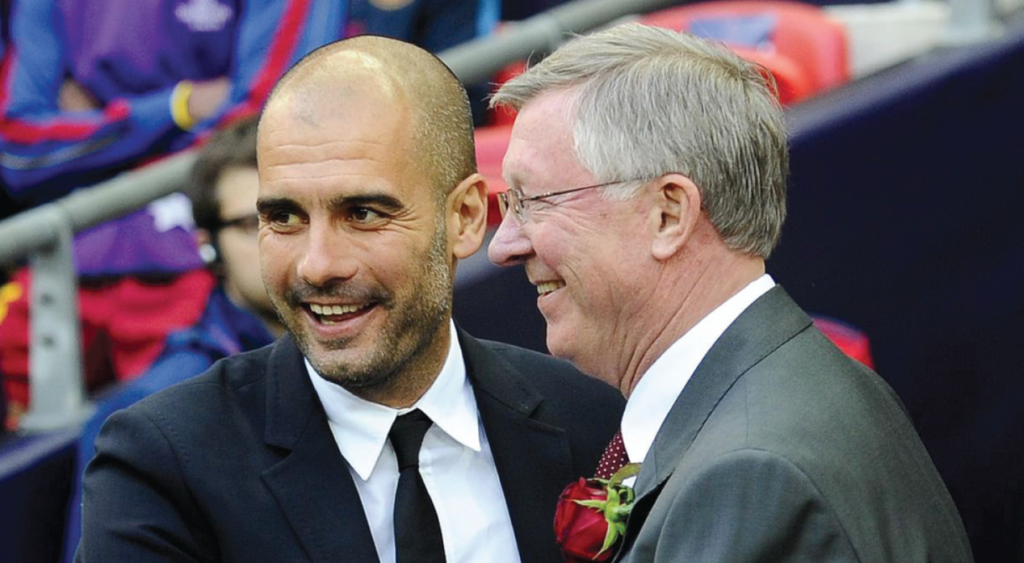
Pep Guardiola, Manchester City Club’s Manager and Alex Ferguson, greatest football manager of all times.
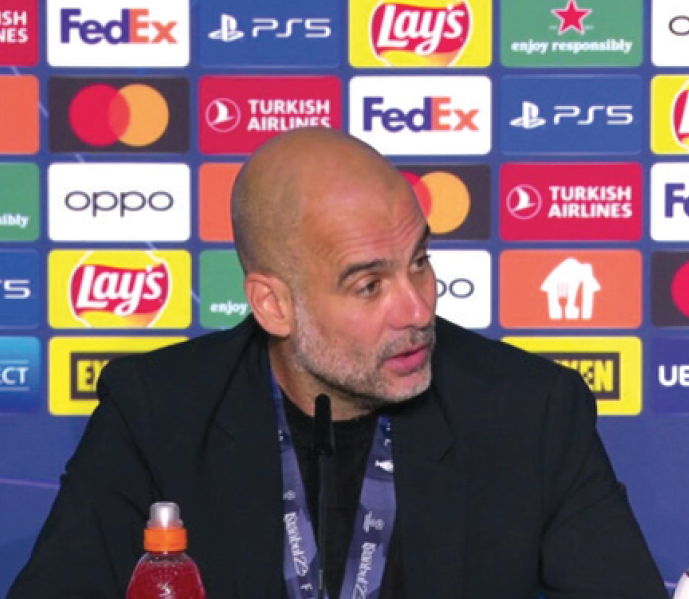
Pep Guardiola, Manchester City Club’s Manager.
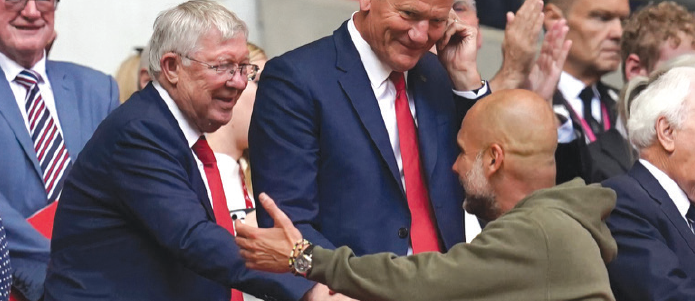
Manchester City head coach Pep Guardiola shows his appreciation toward Sir Alex Ferguson after receiving a supportive message from him ahead of the final.


